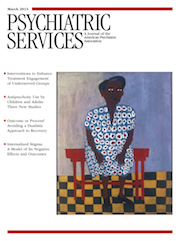Treatment-Seeking Barriers for Veterans of the Iraq and Afghanistan Conflicts Who Screen Positive for PTSD
Abstract
Objectives:
Barriers associated with the decision not to seek treatment for symptoms of combat-related posttraumatic stress disorder (PTSD) were examined.
Methods:
Participants were 143 military men and women who served in Operation Enduring Freedom or Operation Iraqi Freedom (OEF/OIF) and who screened positive for posttraumatic stress disorder (PTSD), as assessed by the PTSD Checklist–Military Version, and who had not sought treatment for PTSD. During a cognitive-behavioral telephone intervention, participants were asked about their beliefs concerning seeking PTSD treatment.
Results:
Four categories of beliefs were associated with the decision to seek treatment, including concerns about treatment (40%), emotional readiness for treatment (35%), stigma (16%), and logistical issues (8%).
Conclusions:
This work suggests areas for intervention efforts to minimize barriers to treatment for PTSD for OEF/OIF veterans.



